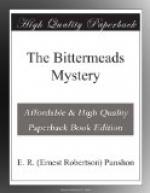Taking from his pocket a small electric flash-lamp Dunn turned its light on his victim.
He seemed a man of middle age with a brutal, heavy-jawed face and a low, receding forehead. His lips, a little apart, showed yellow, irregular teeth, of which two at the front of the lower jaw had been broken, and the scar of an old wound, running from the corner of his left eye down to the centre of his cheek, added to the sinister and forbidding aspect he bore.
His build was heavy and powerful and near by, where he had dropped it when he fell, lay the jemmy with which he had struck at Dunn. It was a heavy, ugly-looking thing, about two feet in length and with one end nearly as sharp as that of a chisel.
Dunn picked it up and felt it thoughtfully.
“Just as well I got my blow in first,” he mused. “If he had landed that fairly on my skull I don’t think anything else in this world would ever have interested me any more.”
Stooping over the unconscious man, he felt in his pockets and found an ugly-looking revolver, fully loaded, a handful of cartridges, a coil of thin rope, an electric torch, a tiny dark lantern no bigger than a match-box, and so arranged that the single drop of light it permitted to escape fell on one spot only, a bunch of curiously-shaped wires Dunn rightly guessed to be skeleton keys used for opening locks quietly, together with some tobacco, a pipe, a little money, and a few other personal belongings of no special interest or significance.
These Dunn replaced where he had found them, but the revolver, the rope, the torch, the dark lantern, and the bunch of wires he took possession of.
He noticed also that the man was wearing rubber-soled boots and rubber gloves, and these last he also kept. Stooping, he lifted the unconscious man on to his shoulder and carried him with perfect ease and at a quick pace out of the garden and across the road to the common opposite, where, in a convenient spot, behind some furze bushes, he laid him down.
“When he comes round,” Dunn muttered. “He won’t know where he is or what’s happened, and probably his one idea will be to clear off as quickly as possible. I don’t suppose he’ll interfere with me at all.”
Then a new idea seemed to strike him, and he hurriedly removed his own coat and trousers and boots and exchanged them for those the burglar was wearing.
They were not a good fit, but he could get them on and the idea in his mind was that if the police of the district began searching, as very likely they would, for Mr. John Clive’s assailant, and if they had discovered any clues in the shape of footprints or torn bits of clothing or buttons—and Dunn knew his attire had suffered considerably during the struggle—then it would be as well that such clues should lead not to him, but to this other man, who, if he were innocent on that score, had at any rate been guilty of attempting to carry out a much worse offence.




